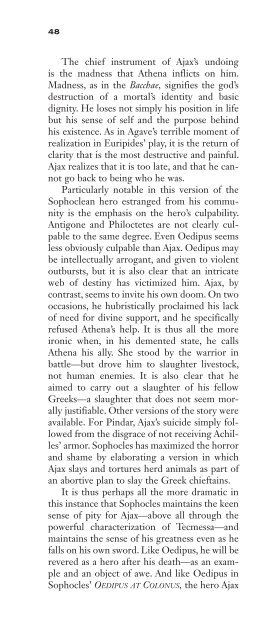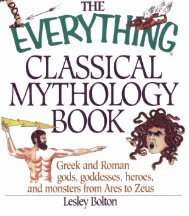Encyclopedia of Greek and Roman Mythology (Facts on File Library ...
Encyclopedia of Greek and Roman Mythology (Facts on File Library ...
Encyclopedia of Greek and Roman Mythology (Facts on File Library ...
You also want an ePaper? Increase the reach of your titles
YUMPU automatically turns print PDFs into web optimized ePapers that Google loves.
The chief instrument <str<strong>on</strong>g>of</str<strong>on</strong>g> Ajax’s undoing<br />
is the madness that Athena inflicts <strong>on</strong> him.<br />
Madness, as in the Bacchae, signifies the god’s<br />
destructi<strong>on</strong> <str<strong>on</strong>g>of</str<strong>on</strong>g> a mortal’s identity <str<strong>on</strong>g>and</str<strong>on</strong>g> basic<br />
dignity. He loses not simply his positi<strong>on</strong> in life<br />
but his sense <str<strong>on</strong>g>of</str<strong>on</strong>g> self <str<strong>on</strong>g>and</str<strong>on</strong>g> the purpose behind<br />
his existence. As in Agave’s terrible moment <str<strong>on</strong>g>of</str<strong>on</strong>g><br />
realizati<strong>on</strong> in Euripides’ play, it is the return <str<strong>on</strong>g>of</str<strong>on</strong>g><br />
clarity that is the most destructive <str<strong>on</strong>g>and</str<strong>on</strong>g> painful.<br />
Ajax realizes that it is too late, <str<strong>on</strong>g>and</str<strong>on</strong>g> that he cannot<br />
go back to being who he was.<br />
Particularly notable in this versi<strong>on</strong> <str<strong>on</strong>g>of</str<strong>on</strong>g> the<br />
Sophoclean hero estranged from his community<br />
is the emphasis <strong>on</strong> the hero’s culpability.<br />
Antig<strong>on</strong>e <str<strong>on</strong>g>and</str<strong>on</strong>g> Philoctetes are not clearly culpable<br />
to the same degree. Even Oedipus seems<br />
less obviously culpable than Ajax. Oedipus may<br />
be intellectually arrogant, <str<strong>on</strong>g>and</str<strong>on</strong>g> given to violent<br />
outbursts, but it is also clear that an intricate<br />
web <str<strong>on</strong>g>of</str<strong>on</strong>g> destiny has victimized him. Ajax, by<br />
c<strong>on</strong>trast, seems to invite his own doom. On two<br />
occasi<strong>on</strong>s, he hubristically proclaimed his lack<br />
<str<strong>on</strong>g>of</str<strong>on</strong>g> need for divine support, <str<strong>on</strong>g>and</str<strong>on</strong>g> he specifically<br />
refused Athena’s help. It is thus all the more<br />
ir<strong>on</strong>ic when, in his demented state, he calls<br />
Athena his ally. She stood by the warrior in<br />
battle—but drove him to slaughter livestock,<br />
not human enemies. It is also clear that he<br />
aimed to carry out a slaughter <str<strong>on</strong>g>of</str<strong>on</strong>g> his fellow<br />
<str<strong>on</strong>g>Greek</str<strong>on</strong>g>s—a slaughter that does not seem morally<br />
justifiable. Other versi<strong>on</strong>s <str<strong>on</strong>g>of</str<strong>on</strong>g> the story were<br />
available. For Pindar, Ajax’s suicide simply followed<br />
from the disgrace <str<strong>on</strong>g>of</str<strong>on</strong>g> not receiving Achilles’<br />
armor. Sophocles has maximized the horror<br />
<str<strong>on</strong>g>and</str<strong>on</strong>g> shame by elaborating a versi<strong>on</strong> in which<br />
Ajax slays <str<strong>on</strong>g>and</str<strong>on</strong>g> tortures herd animals as part <str<strong>on</strong>g>of</str<strong>on</strong>g><br />
an abortive plan to slay the <str<strong>on</strong>g>Greek</str<strong>on</strong>g> chieftains.<br />
It is thus perhaps all the more dramatic in<br />
this instance that Sophocles maintains the keen<br />
sense <str<strong>on</strong>g>of</str<strong>on</strong>g> pity for Ajax—above all through the<br />
powerful characterizati<strong>on</strong> <str<strong>on</strong>g>of</str<strong>on</strong>g> Tecmessa—<str<strong>on</strong>g>and</str<strong>on</strong>g><br />
maintains the sense <str<strong>on</strong>g>of</str<strong>on</strong>g> his greatness even as he<br />
falls <strong>on</strong> his own sword. Like Oedipus, he will be<br />
revered as a hero after his death—as an example<br />
<str<strong>on</strong>g>and</str<strong>on</strong>g> an object <str<strong>on</strong>g>of</str<strong>on</strong>g> awe. And like Oedipus in<br />
Sophocles’ oedipus at coL<strong>on</strong>us, the hero Ajax<br />
Alcestis<br />
has a c<strong>on</strong>necti<strong>on</strong> with Athens. The Chorus <str<strong>on</strong>g>of</str<strong>on</strong>g><br />
Salaminian sailors stresses its place <str<strong>on</strong>g>of</str<strong>on</strong>g> origin—<br />
an important site <str<strong>on</strong>g>of</str<strong>on</strong>g> Athenian patriotism—<str<strong>on</strong>g>and</str<strong>on</strong>g><br />
apostrophizes Athens c<strong>on</strong>spicuously. Ajax does<br />
the same shortly before his death. The Athenians<br />
themselves h<strong>on</strong>ored Ajax’s memory in<br />
their own way by sitting as spectators before<br />
this dark <str<strong>on</strong>g>and</str<strong>on</strong>g> fascinating play.<br />
Alcestis Euripides (438 b.c.e.) Euripides’<br />
Alcestis was produced in 438 b.c.e. <str<strong>on</strong>g>and</str<strong>on</strong>g> w<strong>on</strong><br />
sec<strong>on</strong>d prize in the tragedy competiti<strong>on</strong>. The<br />
story c<strong>on</strong>cerns Admetus, king <str<strong>on</strong>g>of</str<strong>on</strong>g> Thessaly:<br />
He has learned that he must die unless he can<br />
find some<strong>on</strong>e to die in his stead. His parents<br />
refuse, <str<strong>on</strong>g>and</str<strong>on</strong>g> the <strong>on</strong>e pers<strong>on</strong> who agrees to do so<br />
is his own wife, Alcestis. At the opening <str<strong>on</strong>g>of</str<strong>on</strong>g> the<br />
acti<strong>on</strong>, Alcestis is near death. The play was presented<br />
fourth in order, the place usually occupied<br />
by a satyr play—a humorous type <str<strong>on</strong>g>of</str<strong>on</strong>g> play<br />
where heroic mythology is typically treated in<br />
a less serious manner. Indeed, we hear that an<br />
earlier tragedian, Phrynicus, had produced a<br />
satyr play <strong>on</strong> Alcestis <str<strong>on</strong>g>and</str<strong>on</strong>g> Admetus. The present<br />
play alludes to aspects <str<strong>on</strong>g>of</str<strong>on</strong>g> the satyr play but<br />
is best described as an unc<strong>on</strong>venti<strong>on</strong>al tragedy.<br />
Euripides <str<strong>on</strong>g>of</str<strong>on</strong>g>ten challenges the c<strong>on</strong>venti<strong>on</strong>s <str<strong>on</strong>g>and</str<strong>on</strong>g><br />
high seriousness <str<strong>on</strong>g>of</str<strong>on</strong>g> the tragic genre <str<strong>on</strong>g>and</str<strong>on</strong>g> presents<br />
his audience with sub-heroic or otherwise<br />
perplexing characters <str<strong>on</strong>g>and</str<strong>on</strong>g> situati<strong>on</strong>s. Admetus<br />
hardly seems to fit the pr<str<strong>on</strong>g>of</str<strong>on</strong>g>ile <str<strong>on</strong>g>of</str<strong>on</strong>g> the hard,<br />
unyielding tragic hero, yet his experience <str<strong>on</strong>g>of</str<strong>on</strong>g><br />
grief <str<strong>on</strong>g>and</str<strong>on</strong>g> loss n<strong>on</strong>etheless achieves a pr<str<strong>on</strong>g>of</str<strong>on</strong>g>ound<br />
res<strong>on</strong>ance. The Alcestis is a play above all about<br />
the necessity <str<strong>on</strong>g>of</str<strong>on</strong>g> death <str<strong>on</strong>g>and</str<strong>on</strong>g> its implicati<strong>on</strong>s for<br />
the human c<strong>on</strong>diti<strong>on</strong>.<br />
SynoPSIS<br />
Apollo enters <str<strong>on</strong>g>and</str<strong>on</strong>g> st<str<strong>on</strong>g>and</str<strong>on</strong>g>s before the house <str<strong>on</strong>g>of</str<strong>on</strong>g><br />
Admetus at Pherae in Thessaly. He explains<br />
that he has been in the service <str<strong>on</strong>g>of</str<strong>on</strong>g> Admetus,<br />
king <str<strong>on</strong>g>of</str<strong>on</strong>g> Thessaly, as a lowly shepherd, because,<br />
angry that Zeus had killed his s<strong>on</strong> Asclepius<br />
with a lightning bolt, he killed Zeus’s smiths,<br />
the Cyclopes. He was therefore c<strong>on</strong>demned to







